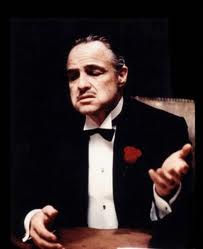You’ve all seen movies with the opening shot of a dark apartment on skid row. With only the light from a neon sign from the bar across the street, the camera closes in through a dirty window, onto a man who is lying across his rumpled bed, smoking a cigarette, and sipping on a glass of whiskey. He’s unshaven, and hung-over from an alcoholic binge. The camera pans to a typewriter on a desk with a sheet of paper rolled up half-way. The blank, stark white paper is an angry retort to the man’s desperation. Next to the typewriter is a bottle of cheap whiskey, an ash tray, overflowing with dirty butts, and a stack of clean, white paper. He’s broke, hungry, and his gal has left him angry and bitter, but he still keeps her picture on his dresser. He rises, crosses over to the picture and looks longingly at the girl. He turns, and defiantly stubs out his cigarette. He drains his glass of whiskey and pours another. He holds the glass while staring at the crumpled papers all over the floor; then he finishes the last of his whiskey in one furious gulp. This guy is definitely a candidate for a bullet to the head. Continue reading “Sobriety vs. the Blank Page”
Tag: Storycraft
Writing is a Business
 Guest post
Guest post
by JM Leitch
First of all, I must tell you up front that this article doesn’t contain strategies about how writers can market their books. It literally means writing – the actual words on the page – and I’m hoping it will serve as a reminder of something important that I, and many other writers, often forget!
Every now and then throughout my life, a tiny, nagging voice coming from some remote and forgotten recess in my brain used to tell me that I should write a book. On three occasions I nearly gave in (I’ve started two novels over the years and one self-help book back in the day when there weren’t so many on the shelves and may have stood a chance of getting noticed!). But after I moved to the beautiful Island of the Gods and writers’ sanctuary that is Bali, with no ‘proper’ job, a daughter in school all day, a husband working away from home over half the year and an idea, I ran out of excuses to give this pesky, persistent little voice.
It was ‘now or never’… and I had never wanted it to be ‘never’… so ‘now’ it was. It was time, in the immortal words of the brand giant Nike, to ‘just do it’. Continue reading “Writing is a Business”
How Well Did the Reader Know the Decedent?
 Here is the situation: You have written a mystery, police-procedural, thriller, spy novel, western, or something of the like. Now you get to the part where there’s a dead guy. You killed off a character. Maybe your bad guy killed the person. Maybe your good guy killed the person.
Here is the situation: You have written a mystery, police-procedural, thriller, spy novel, western, or something of the like. Now you get to the part where there’s a dead guy. You killed off a character. Maybe your bad guy killed the person. Maybe your good guy killed the person.
It ramps up the drama. It gives urgency and purpose to the story. Maybe the good guy has to stop the bad guy before he kills again. Maybe the vigilante just wrought his first bit of rough justice. Continue reading “How Well Did the Reader Know the Decedent?”
Storycraft 101

We have covered a lot of the technical aspects of writing. All of those are important. You want your manuscript to be well-edited and as error-free as possible. You want a nice cover, because you never get a second chance to make a first impression. You need a nice cover blurb that will hook the reader and invite further exploration.
Problems in any of those areas can cause a reader to hate your book. Good storycraft is the one thing that can cause a reader to love your book in spite of problems in those other areas. You can actually see evidence of this in reviews. You do not see reviews that call the author’s sparse use of the semicolon and deft application of commas breathtaking. The cover might sell a book, but it is rarely the subject of a line in a review. A good book is nothing more than a good story well-told. That is storycraft.
I break storycraft into seven elements: Authenticity, Authority, Continuity, Character Growth, Foreshadowing, Pacing, and Resolution. Continue reading “Storycraft 101”

